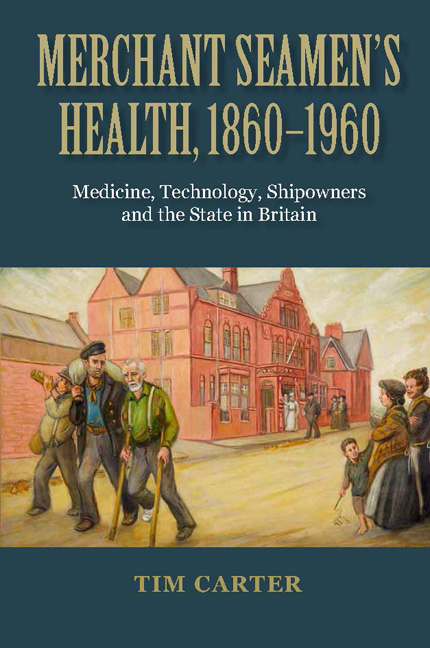Book contents
- Frontmatter
- Dedication
- Contents
- List of Illustrations
- Preface
- Acknowledgements
- List of Abbreviations
- Glossary of nautical terms used
- Introduction
- 1 Health at sea before 1860
- 2 Unseaworthy seamen
- 3 The health of merchant seamen in the nineteenth century
- 4 Injury and disease at sea in the nineteenth century
- 5 The seaman ashore: victim, threat or patient?
- 6 Bad food and donkey's breakfasts
- 7 Fit for lookout duties
- 8 The long-term health of seamen
- 9 War, manpower and fitness for service
- 10 Seamen's health in the welfare state
- 11 Retrospect and prospect
- Bibliography
- Index
10 - Seamen's health in the welfare state
Published online by Cambridge University Press: 05 November 2014
- Frontmatter
- Dedication
- Contents
- List of Illustrations
- Preface
- Acknowledgements
- List of Abbreviations
- Glossary of nautical terms used
- Introduction
- 1 Health at sea before 1860
- 2 Unseaworthy seamen
- 3 The health of merchant seamen in the nineteenth century
- 4 Injury and disease at sea in the nineteenth century
- 5 The seaman ashore: victim, threat or patient?
- 6 Bad food and donkey's breakfasts
- 7 Fit for lookout duties
- 8 The long-term health of seamen
- 9 War, manpower and fitness for service
- 10 Seamen's health in the welfare state
- 11 Retrospect and prospect
- Bibliography
- Index
Summary
A true and fair picture
As the hostilities of the Second World War were drawing to a close, a new conflict arose in a scientific journal that related to the frequency of illness in seamen as compared to other groups of workers. This was perhaps a reflection of the importance attached to this topic during the war, and also shows a move away from the earlier neglect of seamen's health by those in the maritime world to a new concern that any risks to their health might be exaggerated. Exaggeration would bring the dangers of public campaigns for reform – a threat to both government and shipowners – and this could in turn strengthen the hands of seafarers' organisations at a time when the nationalisation of industry and the benefits of a planned economy formed a large part of political debate.
An editorial published in the new British Journal of Industrial Medicine, a journal that was itself a product of the greater use of science to improve practice under wartime conditions, stated that the mortality rate of seamen from all causes of death was double that in the general population, while for tuberculosis it was four times higher. These figures were contested by several of the leading doctors working in the maritime industry, and this inaccuracy was discussed with Sir William Elderton, the deputy government actuary and a former statistical adviser to the Ministry of War Transport, who agreed that they were not supported by the evidence.
- Type
- Chapter
- Information
- Merchant Seamen's Health, 1860–1960Medicine, Technology, Shipowners and the State in Britain, pp. 153 - 170Publisher: Boydell & BrewerPrint publication year: 2014



